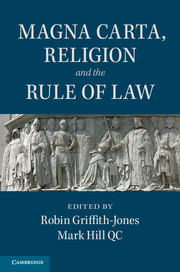Book contents
- Frontmatter
- Contents
- List of contributors
- Preface and acknowledgments
- I Introduction
- II The birth of Magna Carta and the spread of its principles
- III Comparative religious approaches to Magna Carta's rule of law
- 9 Quranic Magna Carta: on the origins of the rule of law in Islam
- 10 Justice in Islamic legislation
- 11 Shariʿa and the rule of law: preserving the realm
- 12 Democracy and the power of religion: some lessons from India
- 13 The still small voice of Magna Carta in Christian law today
- 14 Magna Carta, rule of law and religious diversity
- IV The contemporary inheritance of Magna Carta
- Appendix The Charters in translation
- Bibliography
- Index
11 - Shariʿa and the rule of law: preserving the realm
from III - Comparative religious approaches to Magna Carta's rule of law
Published online by Cambridge University Press: 05 May 2015
- Frontmatter
- Contents
- List of contributors
- Preface and acknowledgments
- I Introduction
- II The birth of Magna Carta and the spread of its principles
- III Comparative religious approaches to Magna Carta's rule of law
- 9 Quranic Magna Carta: on the origins of the rule of law in Islam
- 10 Justice in Islamic legislation
- 11 Shariʿa and the rule of law: preserving the realm
- 12 Democracy and the power of religion: some lessons from India
- 13 The still small voice of Magna Carta in Christian law today
- 14 Magna Carta, rule of law and religious diversity
- IV The contemporary inheritance of Magna Carta
- Appendix The Charters in translation
- Bibliography
- Index
Summary
Introduction
There is a certain irony in commemorating Magna Carta today, since so little of it survives as statute. Most of its articles have been repealed by subsequent legislation. For a document that is over 800 years old, that should not be surprising. Yet it endures as more than a mere document. It is an icon of law and order, justice and rule of law. In the light of that sentiment, however, one cannot help but flinch at some of its provisions, in particular those that seem to identify as potential threats minority groups who, given their minority status, may have been vulnerable at the time. In this regard, clauses 10 and 11 of Magna Carta of 1215 are of particular interest:
10. If anyone who has borrowed from the Jews any amount, great or small, dies before the debt is repaid, it shall not carry interest as long as the heir is under age, of whomsoever he holds [his lands]; and if that debt falls into our hands, we will take nothing except the principal sum specified in the bond.
11. And if a man dies owing a debt to the Jews, his wife may have her dower and pay nothing of that debt; and if he leaves children under age, their needs shall be met in a manner in keeping with the holding of the deceased; and the debt shall be paid out of the residue, saving the service due to the [deceased's feudal] lords. Debts owed to others than Jews shall be dealt with likewise.
As much as Magna Carta is celebrated as a testament to law and justice, the reference to Jews can understandably unsettle modern readers. It is troubling to see how often these clauses can quickly be brushed aside as if aberrations that distract from the main thrust of the document, namely its commitment to rule of law. For instance, Kent Worcester, when introducing a symposium on the Great Charter, briskly remarked: ‘While [Magna Carta] affirmed numerous social distinctions, it nevertheless assumed a rough legal parity among those people designated as free men.’
- Type
- Chapter
- Information
- Magna Carta, Religion and the Rule of Law , pp. 196 - 214Publisher: Cambridge University PressPrint publication year: 2015
- 2
- Cited by



